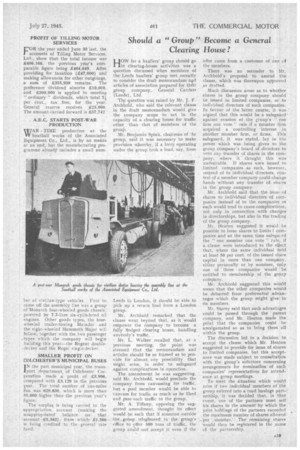Should a "Group " Become a General Clearing House?
Page 21

If you've noticed an error in this article please click here to report it so we can fix it.
HOW far a hauliers' group shOuld go in clearing-hdirse activities was a question discussed When menthers of the Leeds hauliers' group met recently to consider the draft memorandum and articles of association prepared for their group company;. General Carriers (Leeds), Ltd.
The-question was raised by Mr. J. F: Archbold, who said the relevant clause in the draft memorandum would .give the company scope to act in the capacity of a clearing house for traffic other than that of members of the group.
Mr. Benjamin Spink, chairman of he group, said it was necessary to make provision w.hereby, if a lorry operating under the group took a load, say, from Leeds to London, It should be able to pick up a return load from •a London group.
Mr. Archbold remarked that the clause went beyond that, as it would empower the company to become a fully fledged clearing house, handling anybody's' traffic.
• Mr. L. Walker recalled that, at a previous meeting, the point was stressed that the memorandurn and articles should be so framed as to provide for almost, any possibility that might arise, in order to safeguard against complications in .operation.
The amendment he was suggesting, said Mr. Archbold. would preclude the company from canvassing for traffic, hut a pool member would be able to canvass for traffic as much as he liked and pass such traffic to the group.
Mr. A. Tiffany; opposing the suggested amendment, thought its effect 'would be such that if someone outside -the. group telephoned-. to th.e. groupls office to offer 500 tons of tfaffic, the group could not accept it even if the
offer came from a customer of one of the members.
There was _no seconder to Mr. Archbold's proposal to amend the clause, which was thereupon approved as drafted.
Much discussion arose as to whether shares in the group company should be issued to limited companies, or to individual directors of such companies. In favour of the latter course, it was argued that this would be a safeguard against evasion of the group's ' one firm one vote " rule ifa member firm acquired a controlling interest in another member firm, or firms. This safeguard, it was stated, lay in the power which was being given to the group company's board of directors to veto any transfer of shares in the company, where it thought_ this was undesirable, If shares were issued to limited -companies as such, however, instead of to individual directors, control of a member company could change hands without any transfer of shares , in the group company.
Mr. Archbold said that the is'sue of shares to individual directors of companies instead of to the companies as such would tend to cause complications. not only in connection with changes in directorships, but also in the trading of the group company.
Mr. Heaton suggested it would -he possible to issue shares to limite I companies and at the same, time salegmrd the " one member one vote" rule, if a clause, were introduced to the etfect that, where the same individual held at least 50 per cent. of the issued share capital in snore than one company, either personally or by nominee, only one of those companies would be entitled to membership of the group company.
Mr. Archbold suggested this would mean that the other companies would. be debarred from preferential advantages which the group might give to its members.
Mr. Storey said that such advantages could be passed through the parent company, and Mr. Heaton made the point that the companies could be . amalgamated so as to bring them all within the group.
The discussion led to a decision to accept the clause which Mr. Heaton suggested to provide for issue of shares : to limited companies, but this acceptance was made subject to consultatiOn with the group's solicitors concerning arrangements for nominatieln of such companies' representatives for attendance at group meetings.
To meet the situation which would arise if two individual members of the group entered into a road haulage part... nership, it was decided that, in that event, one of the partners must Sell his shares to the amount by which the joint .holdings of the partners exceeded the maximum number of shares allowed per 'I'meinber.' . _The' remaining Shares would then be registered in the came of the partnership..




















































